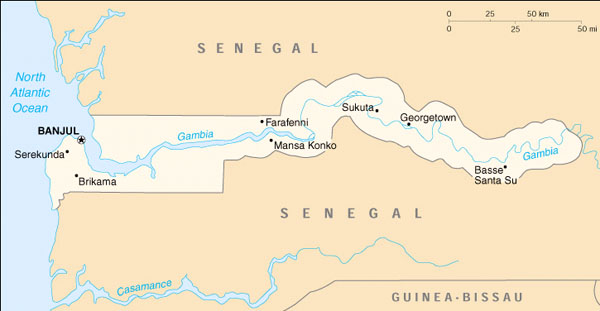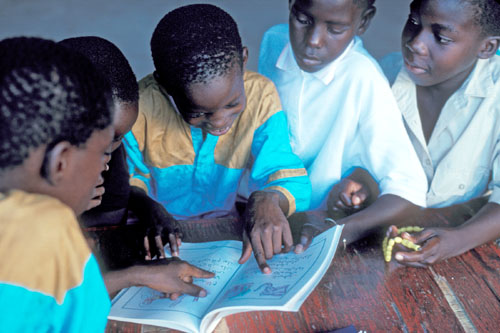Basse (Upper River Division)

In comparison to Banjul and the Western Division (WD) area as a whole, the city of Basse, located at the far east of The Gambia, in the Upper River Division (URD), is facing a stronger socio-economic hardship. Basse’s economy relies on agriculture (the Gambia River is very narrow at this point and does not offer as much fishery resources as in other parts of the country). In addition to poor economic resources, Basse is also a place of high immigration (from Casamance, Gambia, Liberia and other close countries). Immigrants enter The Gambia without any resources, often leaving one part of the family in their home country and engaging themselves in any kind of subsistence activity (petty trading, paid domestic work and, unfortunately, prostitution).
Indicators show that the living conditions in this part of the country are highly concerning:
Only 11.2 per cent of children aged three to five are attending some form of organized early education programme
Only 20.3 per cent of the population aged 15 or above is literate
Only 3.4 per cent of women aged 15-49 have sufficient knowledge of how HIV/AIDS is transmitted
Only 29 per cent of children aged 6-12 attend primary school
Data from the Multiple Indicator Cluster Survey Report of 2000 on the Gambia (UNICEF-Government cooperation)
This last statistic is particularly concerning, and shows just how vital the SOS Primary School is to the children in Basse.
The Benefits of Education for Children and Society

Education breaks the vicious cycle of poverty. If a parent is uneducated, for example, they will either be unemployed or have a very low-paid job. In many parts of Africa, parents must pay school fees, and buy uniforms, stationery etc. As a result, parents cannot afford to send their children to school, and the cycle continues. The children, like their parents, will be confined to a difficult life: they will have little money and food, no voice in society, and are likely to be unhealthy as they are unaware of hygiene issues and cannot afford medicines. For women, the lack of an education and job prospects may mean she is forced to marry just to stay alive
Educating a child means that child is more likely to:
Have a better-paid job, and therefore a better standard of living
Be empowered and be able to demand their rights.
Be healthier as they will have been educated about sanitation and diseases such as HIV/AIDS, and they will be able to afford treatment
Be independent: they will not have to rely on others for money or food. This improves a person’s confidence and self-esteem.
Improve the health of their own families when the children become parents themselves. This is particularly true when educating girls. In developing countries, childcare falls much more to the mother. If a mother knows about hygiene, sanitation and the signs of illness, she can help prevent infant mortality. An educated woman is also more likely to be independent, be more equal in a relationship, and demand the use of contraception, which decreases the number of pregnancies she has and means she is less likely to die from pregnancy.
Help towards the economic growth of the country.
Education is the most cost-effective and sustainable way of ensuring economic and social development today: according to the United Nations Educational, Scientific and Cultural Organisation (UNESCO), “Education constitutes a vital tool for addressing virtually all global problems relevant for sustainable development, in particular poverty, HIV/AIDS, environmental degradation, knowledge formation and sharing, rural development and changes in production and consumption patterns.”
SOS Children is famous not only for its children’s Villages, but also for its commitment to education. We are known as a "gutter-to-school" charity in contrast to "gutter-to-pavement" charities which only help children's immediate problems. We have built and run 192 schools with which are attended by over 93,000 children. We also run 117 Vocational Training Centres for youths, which provide them with the skills needed by local labour markets. SOS Children does not want children to be dependent on hand-outs when they are older: we want our children to have the skills they need to shape their own futures. SOS Children’s schools offer scholarships to the poorest students, and we provide all uniforms, stationery etc. We believe in equality of opportunity. Our schools have given poorer communities, such as the one in Bakoteh, a lifeline.
SOS Primary School, Basse
The future SOS Primary School has the support of the Ministry of Social Welfare of in The Gambia.
420 children aged 6-12 will benefit from the new SOS Primary School each year. Children attending the school will come from both the SOS Children’s Village Basse and from the local community. SOS Children encourages the children at our villages to interact with local children, and we want our facilities to benefit those who live near them.
Nine personnel will be employed at the school: six teachers, the director and two administrators.
Construction work will be carried out using local resources
and labour. This means the construction will create
employment and boost the local economy.
The walls and foundations will be built of cement, the ceilings will be wooden. Roofs will be made of corrugated iron, and the floors will be tiled. Electricity, water and sewage facilities are also needed.
The SOS Primary School will be built in 2006.